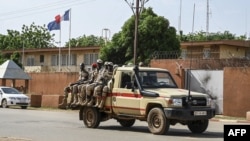The communique sent by Niger's Ministry of Foreign Affairs earlier this week and seen by The Associated Press on Thursday said that French Ambassador Sylvain Itte "no longer enjoys the privileges and immunities attached to his status as a member of the diplomatic staff of the embassy."
The document also says the diplomatic cards and visas of the ambassador's families have been canceled.
The people involved in a recent military coup in Niger have "no authority" to ask France's ambassador in Niamey to leave, the foreign ministry in Paris said on Thursday.
"We constantly evaluate the safety and operating conditions of our embassy," the ministry added.
The mutinous soldiers who ousted Niger’s president more than a month ago gave Itte 48 hours to leave the country last week. The deadline expired on Aug. 28 without France recalling Itte.
After Itte first was told to leave Niger, French President Emmanuel Macron said the envoy would remain in his post. Macron spoke out firmly against the coup leaders while insisting that France, Niger's former colonial rule, is not the country's enemy.
Since toppling democratically elected President Mohamed Bazoum, the junta has leveraged anti-French sentiment among the population to shore up its support. People chant “Down with France” at near-daily rallies in the capital, Niamey, and at times in front of a French military base in the city.
The regional bloc ECOWAS deployed a “standby” force and ordered it to transition Niger back to constitutional rule. The force has not yet entered Niger, and the bloc says the door remains open to dialogue but it won’t wait forever.
According to analysts, the expulsion of the French ambassador and the revocation of his diplomatic immunity put France in a challenging position.
“If Paris recognizes the military authority in Niger, which is the heart of the matter, it could potentially limit the reputational damage that France is facing in its former African colonies,” Mucahid Durmaz, a senior analyst at global risk consultancy Verisk Maplecroft, said.
At the same time, Durmaz thinks it's unlikely France would use the junta's moves against the ambassador as a reason to launch a military intervention backed by ECOWAS troops.
“The catastrophic implications of a regional war, alongside an increase in already high anti-France sentiment in the region, means Paris would likely shy away from such a move,” Durmaz said.









Forum